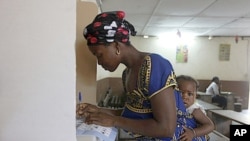Voters in Ivory Coast looking to rebuild their war-torn country went to the polls in low numbers for a parliamentary election that will likely solidify the rule of President Alassane Ouattara. Though the threat of violence has been largely subdued, the opposition boycott looms over the vote and its results.
Some 1,000 candidates are vying to fill 255 seats in the first parliamentary vote in over a decade. Members of ousted president Laurent Gbagbo's party have boycotted the election, making it easier for President Ouattara's Democratic party to win a majority and fulfill its agenda. The president voted early Sunday in Abidjan.
President Ouattara said Ivorians need parliament members who will work to make laws that can adapt to a reconciled and reunited Ivory Coast and its aspirations - in which, he added, the parliament must play an essential role.
Despite the president's encouragement, voter turnout was low for the election, which is thought to be a foregone conclusion. Members of Gbagbo's Ivorian Popular Front, the FPI, are absent from the ballots in solidarity with their leader, whose refusal to leave office after losing last year's presidential election triggered a conflict that left 3,000 dead. He was arrested in April and now awaits trial for crimes against humanity in The Hague.
His supporters say his treatment is unfair, as atrocities were committed on both sides of the conflict and only Gbagbo's camp was punished. Alain Kouakou of Abidjan joined the boycott and said the new parliament will be illegitimate.
Kouakou says there are faults, lies and no liberty in this election and it does not respect the constitution so he cannot vote. He says there is still a post-electoral crisis that has not been resolved.
Although some former FPI members are running as independents, the anticipated absence of a strong opposition in parliament will ease Ouattara's agenda to rebuild the nation's social and economic facilities. Thomas Kablan voted Sunday for exactly that reason.
Kablan says he does not agree with the boycott and that Ivory Coast must accept the vote and the changes in the country.
Though the absence of the FPI in the new government may further disenfranchise Gbagbo supporters. Georgette Kouassi of Abidjan's Cocody district says she fears the conflict will start anew.
Kouassi says Ivorians were traumatized by the armed combatants and she hopes they will be disciplined so they do not come back.
Five people were killed during the election campaign, including three in a rocket attack on a Ouattara rally. The United Nations sent 7,000 troops to join 25,000 Ivorian security personnel for the elections and the voting is expected to continue without incident.













